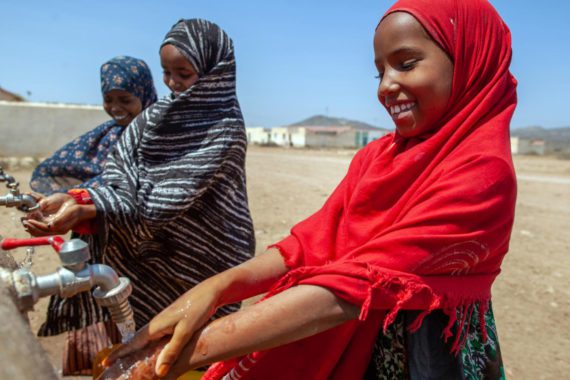Humanity is facing a global hunger emergency this year—driven by a confluence of armed conflict, climate change, and economic crises in addition to rising hunger and malnutrition caused by the COVID-19 pandemic.
Rapidly rising numbers of people living with hunger and malnutrition in dozens of countries call for redoubled efforts against hunger and its causes at every level, from the U.N. General Assembly to humanitarian agencies and nonprofit groups delivering lifesaving food to advocacy organizations such as Bread for the World.
Near-famine levels of hunger threaten people in parts of Somalia, and conditions are worsening. This would be the country’s second famine of the 21st century. The first, in 2011, killed an estimated 260 million people, half of them children under 5.
With Somalia on the brink of famine, we need global attention and action to save as many lives as possible. During this year’s 77th session of the United Nations General Assembly (UNGA), President Biden announced more than $2.9 billion in new assistance from the U.S. government to respond to global food insecurity, including $150 million for Somalia.
People in Somalia have endured decades of political strife and violence. The last central government that was acknowledged by all regions and recognized by the international community fell in 1991, with halting progress toward national unity since 2012. Waxing and waning levels of armed conflict and more than 30 years without the protection of a stable central government have created alarming levels of life-threatening hunger and malnutrition. For at least the last dozen years, the problem has been exacerbated by damage to the environment and economy due to climate change.
Hunger crises are categorized by the severity and number of people affected by hunger and malnutrition in a community or region. While these distinctions are necessary because resources are virtually always limited and aid workers must set priorities, they make little difference to families and individuals struggling to find enough to eat. People-centered measures such as how much food a household has on hand and whether the family’s young children are moderately or severely malnourished are much more meaningful distinctions. Famine, the most severe stage as defined by experts, means that more than 30 percent of children under 5 are acutely malnourished.
During this year’s UNGA meetings, the United States convened a global food security summit that was co-chaired with leaders of the European Union, African Union, and Spain, and co-hosted with Germany, Nigeria, Indonesia, and Colombia. Leaders reaffirmed their commitment to act with urgency and at scale to alleviate the dire consequence of hunger. Such global commitments are important, but they cannot achieve progress on their own. Actions are essential.
People in famine or near-famine situations are most in need of the resources the United States and other industrialized nations are fortunately able to make available. The U.S. commitment of additional food security resources during UNGA 2022 could enable more of the estimated 36.1 million people affected by severe drought in Somalia and other countries in the Horn of Africa to rebuild their lives.
The new commitment of $2.9 billion will save lives through emergency interventions and investment in medium to long-term food security assistance. Both are essential to ending hunger: feeding people now and enabling them to avoid future emergencies.
It is essential for the global community to continue to lift up and support our neighbors who are suffering, whether they live in Mississippi or Somalia. We must work to end hunger as well as pray to God on behalf of people living with hunger.
Abiola Afolayan is senior international policy advisor with Bread for the World.



